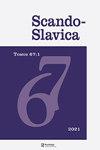Дистантное употребление рефлексива в составе инфинитивной клаузы в русском языке: XIX век vs. современная норма
IF 0.2
0 HUMANITIES, MULTIDISCIPLINARY
引用次数: 0
Abstract
ABSTRACT The paper deals with the long-distance usage of the Russian reflexive pronoun sebja when it occurs within an infinitival clause. In this usage, the antecedent of sebja is the subject of the main clause and not the understood subject of the infinitive. Based on the Russian National Corpus data, restrictions on the long-distance usage of sebja are investigated with reference to the Russian language of the nineteenth century and according to the contemporary norm. I identify three factors (the semantic role of sebja, the availability of the local reading of sebja, the empathy locus) that influence the acceptability of the long-distance usage of the reflexive in modern texts, but which played little, if any, role in the texts of the nineteenth century. The study, conducted within a broader project that involved the micro-diachronic analysis of Russian (its grammar and lexicon), illustrates how investigating the earlier periods of a language’s life may shed light on the properties of that language today. 1 1 Статья подготовлена участником «Программы стажировок работников и аспирантов российских вузов и научных организаций в НИУ ВШЭ» на базе Школы лингвистики факультета гуманитарных наук НИУ ВШЭ на основе данных, полученных в период стажировки. Автор глубоко признателен руководителю стажировки Е. В. Рахилиной, а также анонимным рецензентам за советы и замечания. Исследование осуществлено в рамках Программы фундаментальных исследований НИУ ВШЭ.在俄罗斯语中,反射的远距离使用:19世纪vs现代标准
本文研究了俄语反身代词sebja在不定式从句中的远距离用法。在这种用法中,sebja的先行词是主句的主语,而不是不定式的主语。以俄罗斯国家语料库数据为基础,参照19世纪的俄语并根据当代规范,调查了对远距离使用sebja的限制。我确定了三个因素(sebja的语义作用,sebja的本地阅读的可用性,移情位点),这些因素影响了现代文本中远程使用自反的可接受性,但在19世纪的文本中几乎没有作用,如果有的话。这项研究是在一个更广泛的项目中进行的,该项目涉及对俄语(语法和词汇)的微观历时分析,它说明了调查一门语言早期的历史如何有助于揭示该语言今天的特性。1Статьяподготовленаучастником«ПрограммыстажировокработниковиаспирантовроссийскихвузовинаучныхорганизацийвНИУВШЭ»набазеШколылингвистикифакультетагуманитарныхнаукНИУВШЭнаосноведанных,полученныхвпериодстажировки。АвторглубокопризнателенруководителюстажировкиЕ。В。Рахилиной,атакжеанонимнымрецензентамзасоветыизамечания。ИсследованиеосуществленоврамкахПрограммыфундаментальныхисследованийНИУВШЭ。
本文章由计算机程序翻译,如有差异,请以英文原文为准。
求助全文
约1分钟内获得全文
求助全文

 求助内容:
求助内容: 应助结果提醒方式:
应助结果提醒方式:


